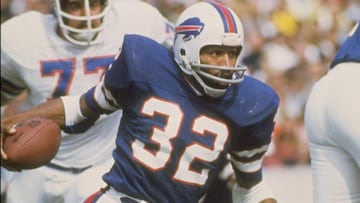The reason why O.J. Simpson wasn’t removed from the Pro Football Hall of Fame
Though many have criticized the HOF’s decision not to strip the late running back of the honor, the reason why it hasn’t is actually quite simple.


In the wake of his death, there has understandably been renewed focus on the controversial life of O.J. Simpson, with many now questioning those individuals and organizations that have chosen to acknowledge the legendary running back’s passing. Among them is the Pro Football Hall of Fame which maintains a bust of him to this day.
O.J. Simpson will always be a Hall of Famer
As is the case with any professional athlete, there is who they are on the field of play and who they are off it. When it comes to O.J. Simpson, that notion couldn’t be any clearer. On Wednesday, the former running back died at the age of 76, following a lengthy battle with cancer. As one can imagine, his passing leaves behind an uneasy balance between recognition for what he achieved as a player, and disgust at the various things he was found to have done as a person.
Where football is concerned, Simpson was inducted into the Pro Football Hall of Fame in 1985 and it’s got to be said it was an easy choice. Consider for a moment that after being selected by the Bills with the No.1 overall pick in the NFL Draft of 1969, Simpson went on to lead the league in rushing on four occasions during an 11-year span while also being named MVP once. From his break-out season in 1972 in which he led the NFL in rushing with 1,251 yards, to his MVP season just one year later in 1973, when became the first running back to cross the 2,000-yard mark, it was clear that the man they called “The Juice” was something special. For perspective, the 2,003 yards that he registered that year were achieved at a time when the NFL season consisted of just 14 games. Indeed, his 143.1 yards per game still stands as the highest rushing average in NFL history.
A statement from the Pro Football Hall of Fame on the passing of OJ Simpson: https://t.co/Ja9HAJloe8 pic.twitter.com/zyNECqH2Yd
— Ari Meirov (@MySportsUpdate) April 11, 2024
Yet, these are the things we know about O.J. Simpson’s career in football and with that in mind, it’s clear that the Pro Football Hall of Fame is only interested in that aspect of his life, explaining that under no circumstance will a player’s bust be removed from its building in Canton, Ohio. “Once elected, nothing in the Pro Football Hall of Fame’s bylaws allows for the removal of a Hall member,” the HOF stated in 2020. Indeed, the organization’s position on the matter was emphasized once again in an official statement from HOF President Jim Porter on Thursday following the announcement of Simpson’s death. “O.J. Simpson was the first player to reach a rushing mark many thought could not be attained in a 14-game season when he topped 2,000 yards,” said Porter. “His on-field contributions will be preserved in the Hall’s archives in Canton, Ohio.” Regarding those contributions, they saw him appear in six Pro-Bowls, receive five first-team All-Pro nods, and be voted onto the NFL’s 100th anniversary all-time team in a career that lasted 11 years.
OK, but what about O.J. Simpson the man?
This is where we have to address the elephant in the room. As has been well documented, O.J. Simpson’s life took a drastic turn in the years that followed his Hall of Fame induction in the mid-80s. In 1994, Simpson was charged with double murder in connection with the deaths of his ex-wife Nicole Brown Simpson, and her friend Ronald Goldman. Though Simpson would later be acquitted of the murders in October 1995, he was later found liable for the deaths in a civil court and ordered to pay $33.5 million in damages to the families of the victims who filed a wrongful death lawsuit against him.
Related stories
It is understood that Simpson didn’t pay the large majority of that sum over the span of his life, however, the Goldmans did receive some money in 1999 when Simpson was forced to sell the Heisman Trophy that he won in college back in 1968 at USC. As per reports at the time, the trophy sold for $255,500 at auction with the funds going to the the Goldman family. Interestingly, the Heisman Trust has also maintained a similar stance to that of the Hall of Fame, never moving to strip Simpson of his trophy. Much like the HOF, the trust has no bylaws in place that allow for the retraction of an award. To that end, it was not surprising to see a statement released following Simpson’s passing. “The Heisman Trophy Trust mourns the passing of 1968 Heisman Trophy winner, O.J. Simpson. We extend our sympathy to his family,” the trust said.
The late, great Tim Russert reflected on OJ Simpson in his autobiography. This was his reaction after taking his son to the Pro Football Hall of Fame and seeing OJ still enshrined there years after the murders. pic.twitter.com/GsXEGB8k59
— Rich Luchette (@richluchette) April 11, 2024
In the end, Simpson’s was a complicated life and one that got progressively worse after the civil suit that he lost. While he never actually served any time in jail for the double murders, he was eventually incarcerated some ten years later at the age of 60 after he was convicted of armed robbery and kidnapping in Las Vegas in 2008. It is understood that Simpson was trying to regain possession of football memorabilia that had previously been sold allegedly including the aforementioned Heisman Trophy. Today the trophy is owned by a Nevada-based businessman who bought it in 2019. Ultimately, it’s completely understandable that many do not have any love for O.J. Simpson the man, but O.J. Simpson the player was in a word, ‘incomparable’.


Complete your personal details to comment